


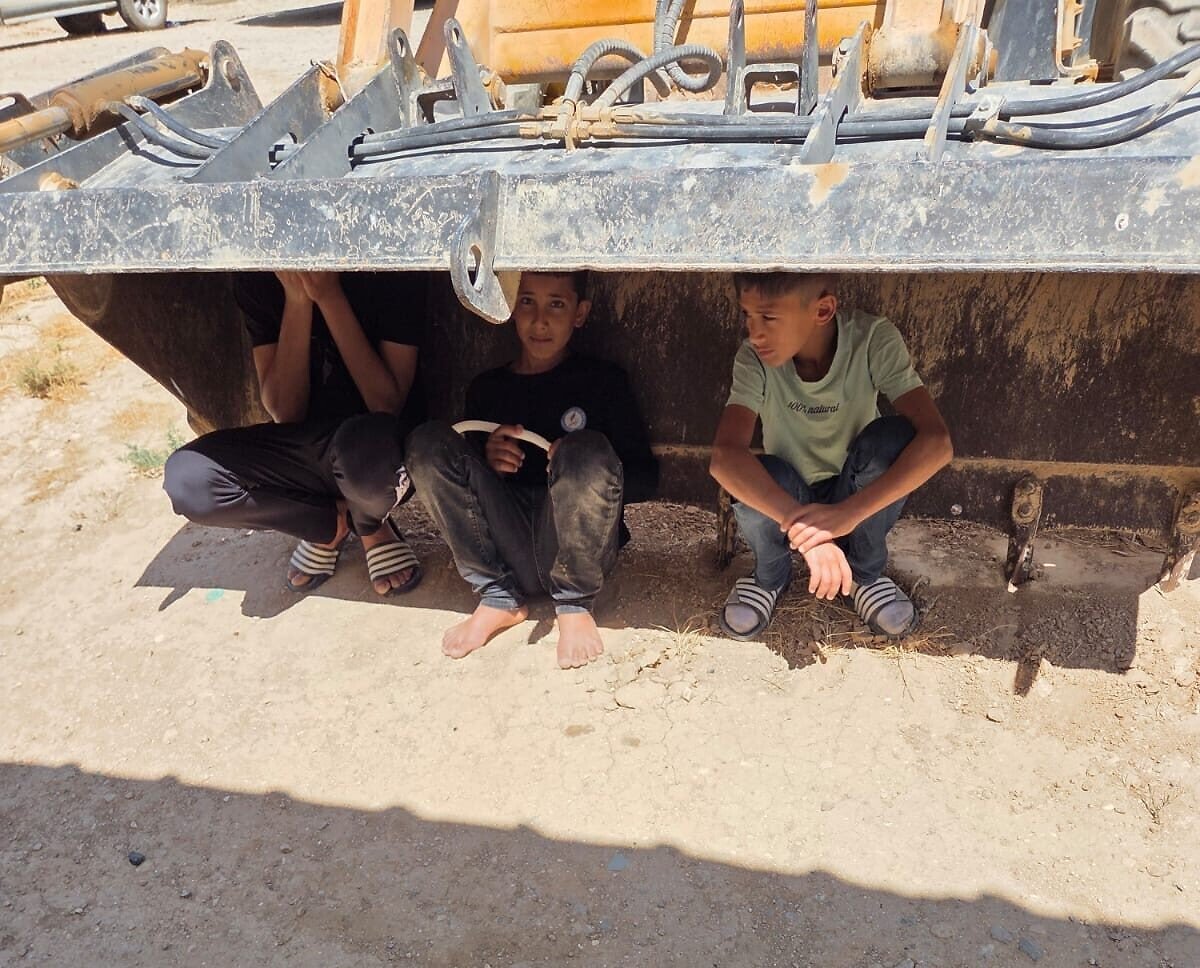
When sirens blared across Israel during the recent missile attacks from Iran, Ibrahim Abu Khalil was ready. The 40-year-old father of five grabbed his children and ran into the night — not to a shelter, because there are none in his village of Umm Matanan in the Eastern Negev — but to the nearest highway overpass.
“Sometimes we stayed there for five or six hours,” he said. “Once, we stayed for two days. I met people who stayed under bridges for 10 days.”
“It doesn’t protect you, but it’s better than nothing,” said Abu Khalil, who has been employed by the Defense Ministry for more than 15 years transporting soldiers to and from bases on different borders. “There are animals at night. It’s very scary.”
Abu Khalil and his family are among more than 100,000 Bedouin citizens in about 35 villages in the Negev Desert that the state does not officially recognize. As a result, they have no protection from rockets or missiles.
Residents reside mainly in tents and tin structures because unrecognized villages are barred from constructing any houses or buildings, including reinforced safe rooms or bomb shelters. They lack emergency infrastructure, have few public services, and often no electricity or paved roads.
These conditions were especially harrowing for residents of unrecognized communities during the recent 12-day conflict with Iran sparked by Israel’s June 13 surprise assault on the Islamic Republic’s top military leaders, nuclear scientists, uranium enrichment sites, and ballistic missile program.
Iran retaliated by launching some 550 ballistic missiles and around 1,000 drones at Israel, killing 28 people and wounding thousands, according to health officials and hospitals, before a ceasefire was reached on Tuesday.
“It’s worse now, but we’ve been living like this since October 7,” said Amira Abu Hadoba, a mother of four and trauma support facilitator in the Bedouin village of Abu Talool. “Every day, we would sit and wait for a rocket to hit our house.”
The 2023 Hamas-led attack saw some 1,200 people massacred and 251 kidnapped to the Gaza Strip, sparking the ongoing Israel-Hamas war. Twenty-two Bedouin citizens of the Negev were killed and six taken hostage, four of whom were eventually released or rescued, and two were murdered in captivity.
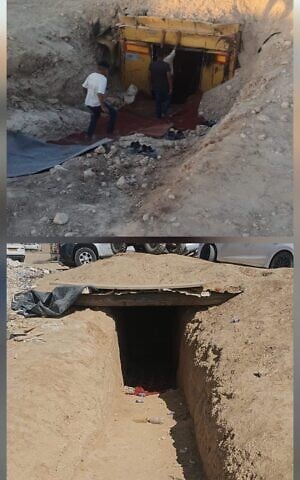
Abu Hadoba said that during the recent 12-day war, while some families took shelter under bridges, others would go to caves, hide beneath tractors, in holes dug underground, or giant cement drainage cylinders.
“We don’t have a shelter. We have nothing,” said Attia Alasam, head of the Regional Council for Unrecognized Bedouin Villages, and also from Abu Talool. “We sit at home and watch the interceptions in the sky and pray.”
Notably, Abu Talool is recognized by the state, yet conditions are indistinguishable from those of unrecognized villages.
“My village has been recognized for 20 years, but the state hasn’t done anything. They won’t give us permits to build, and if we try to build without them, they demolish our homes,” Alasam said.
About 44 miguniyot — portable shelters often consisting of basic cement structures without doors or ventilation — have been placed in unrecognized villages. Most were donated by NGOs and have been deemed below safety standards by Israel’s Home Front Command. Even officially recognized Bedouin towns like Abu Talool remain severely underserved.
The Home Front Command, responsible for distributing bomb shelters to the population, declined to comment.
The Authority for Development and Settlement of the Bedouin in the Negev and the Ministry of the Negev, Galilee and National Resilience, responsible for overseeing the needs of citizens in these communities, did not respond to requests for comment.
“The schools are rarely protected, too, and that’s the only service the state provides,” Alasam said.
Often in unrecognized (and some recognized) Bedouin villages, if there are one or two miguniyot for the entire population, they are typically at the local school.
Under the threat of Iranian ballistic missiles, and rockets from Hamas before that, Abu Hadoba would shelter her four children in a nearby school with a portable bomb shelter — but said there’s rarely enough space.
“The shelters we do have can only fit about 10 people. Usually, it’s women and children who go in. The men stay outside,” she said.
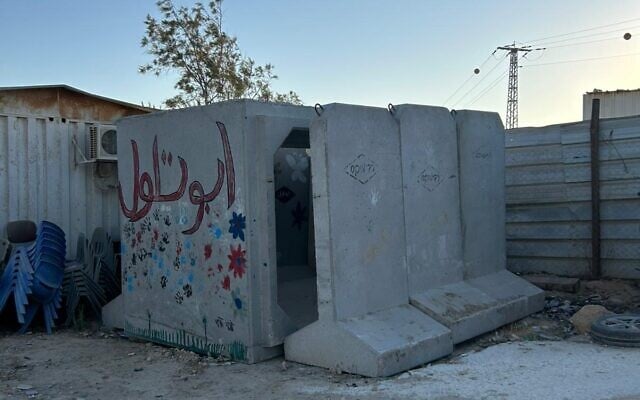
Speaking with The Times of Israel two days after the ceasefire between Israel and Iran took effect, she said her 9-year-old daughter still refuses to sleep alone or leave her side.
“She’s afraid to sleep,” said Abu Hadoba. “I understand. I try to be strong in front of my children, but I’m also afraid.”
Abu Hadoba is a member of Nashmiyat, a network of women leaders in mainly unrecognized Bedouin villages, and since October 7, has served as a trauma group facilitator for the Council for Unrecognized Villages, going to villages to provide support and counseling amid the ongoing threat of missile attacks.
“Many families need PTSD treatment,” she said. “But people don’t always understand the importance of mental health therapy. There’s a lot of shame around it — especially for men, who want to appear strong.”
She recounted a recent Zoom session with residents from one of the villages where she works, during which several family members — including children — had been admitted to Soroka Medical Center for trauma-related treatment stemming from the war with Iran.
“They don’t eat. They can’t function,” she said. “This trauma doesn’t go away.”
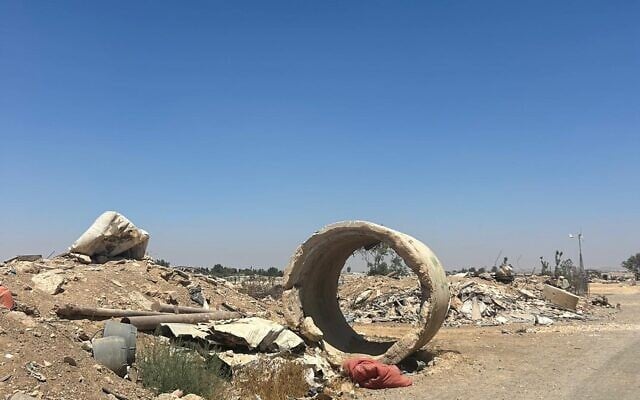
Abu Khalil, too, sees the toll the war has taken on his young children. “Every week, I take the children to the hospital because they are unwell,” he said. “This entire period of the war has been a nightmare. Everyone cries.”
He built a house before October 7, only to have it demolished by the state. Since then, he, his wife, and children — aged 2 to 9 — have lived in a tent.
As a matter of policy, the state refuses to invest in infrastructure in unrecognized villages or permit residents to build privately, aiming instead to relocate them to state-approved areas. Government ministries have declined to fund shelters, roads, or kindergartens in these communities as a result.
Several petitions submitted to Israel’s High Court of Justice seeking permission to build reinforced public shelters, including last year by the Council for Unrecognized Villages, have been unsuccessful.
“The demand from Bedouin society today is to grant permits to build reinforced security rooms in the unrecognized villages of the Negev,” said Huda Abu Obaid, executive director of the Negev Coexistence Forum. “For years, we’ve been warning about the safety situation in these villages, and the state has never taken responsibility.”
The court ruled that protection is “a private issue and that it is not the state’s obligation to provide it,” in which case, according to Abu Obaid, who is also a lawyer, “the state needs to allow Bedouin residents to build safe rooms legally, which they currently don’t.”
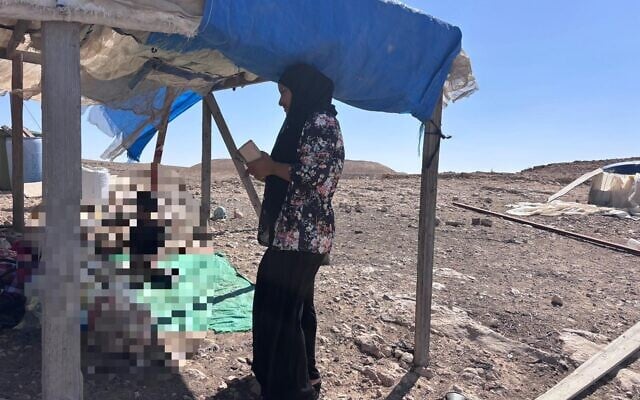
“There was a discussion in the Knesset a few days ago,” said Alasam. “But the government says they’ll only give us shelters if we agree to move — if we leave our land, our history, our culture.”
Approximately 20 Bedouin citizens were killed by rocket fire on October 7, 17 of whom were from unrecognized villages, including six children, according to a report from the Israeli Democracy Institute. The three other civilians were residents of the Bedouin city of Rahat — home to around 80,000 residents and which does not possess a single public shelter.
There have been numerous injuries and dozens of homes destroyed by rocket fire among the villages since, according to Alasam.
Amina Hassouna, a 7-year-old girl from an unrecognized Bedouin village, was the sole serious casualty of Iran’s April 2024 missile attack on Israel. She was critically injured when shrapnel from an intercepted missile tore through her tin-roofed home, which lacked a bomb shelter. She was discharged from rehabilitative care only a year later, in April 2025.
On top of the lack of shelters, many unrecognized villages are not protected by the Iron Dome missile defense system because they are designated as “uninhabited” by the state.
“When rockets were launched from Gaza, they let them fall here,” Alasam added. “They call it open territory. They tried to intercept Iranian missiles, but the shrapnel fell all around us.”
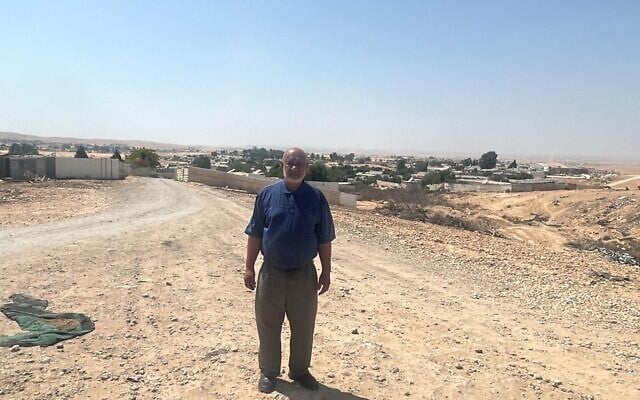
“We’ve been talking about this for 10 years. The government isn’t interested in defending us,” he added.
Abu Hadoba, who has spoken at the Knesset, said her appeals have gone nowhere.
“We’re citizens of this country, but we don’t feel like we’re considered a part of this country,” she said. “We’re not asking for a lot: to have a house, to work, to be safe, to live with dignity.”
“I feel like a foreign citizen — and that’s not true,” Abu Khalil said. “Before the state was here, my family was here. We have roots. We have history. But the state doesn’t care about us.”
